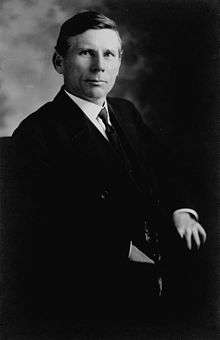Seaborn Roddenbery
| Seaborn Roddenbery | |
|---|---|
 Seaborn Roddenbery in 1912 | |
| Member of the U.S. House of Representatives from Georgia's 2nd district | |
|
In office February 6, 1910 – September 25, 1913 | |
| Preceded by | James M. Griggs |
| Succeeded by | Frank Park |
| Personal details | |
| Born |
January 12, 1870 Decatur County, Georgia |
| Died |
September 25, 1913 (aged 43) Thomasville, Georgia |
| Political party | Democratic |
| Alma mater | Mercer University |
| Occupation | lawyer, educator |
Seaborn Anderson Roddenbery (January 12, 1870 – September 25, 1913), sometimes spelled Roddenberry, was a Democratic member of the U.S. House of Representatives for the state of Georgia, best known for his proposal of an anti-miscegenation amendment to the United States Constitution. He was elected to the 61st Congress to replace the deceased James M. Griggs, and re-elected to the 62nd and 63rd Congresses before dying in office.
Early life and career
Born on a farm in Decatur County, Georgia, Roddenbery attended Mercer University for three years, but was forced to withdraw due to family finances. In 1891, he was elected to represent his home district in the Georgia House of Representatives. After two terms, he was appointed professor of Language and Mathematics at South Georgia College. In 1894, after reading law and being admitted to the practice of law in Georgia, Roddenbery resigned his academic position. He spent the next few years building a private practice and networking within the Georgia political structure. During this time, Rodenbery was the president of the Thomas County, Georgia, Board of Education from 1895 to 1898 and was appointed to that county's court as a judge from 1897 to 1901. Rodenbery was elected mayor of Thomasville, Georgia, and served in that position from 1903 to 1904.
Congressman
In 1910, he was elected to represent Georgia's 2nd congressional district in the United States House of Representatives for the remainder of the 61st United States Congress when that seat fell vacant due to the death of James M. Griggs. Rodenbery was reelected to the 62nd and 63rd Congresses; however, he died in Thomasville on September 25, 1913, while in office and was buried in that city's Laurel Hill Cemetery.
The reputation Roddenbery had already garnered in Georgia as a skillful and inspiring orator was renewed in the nation’s capitol. Quick of both tongue and wit and possessed of a natural elegance of bearing and speech, he won the awe of fellow Congressmen who were amazed at how much he could fit the extremely limited speaking time he was often allotted on the House floor.
Roddenbery earned a reputation as an extreme conservative on fiscal matters. He was particularly militant in his opposition to increasing the pensions of Civil War veterans, a position mostly attributable to the fact that the thousands of surviving Confederate veterans in Georgia, a state that endured some of the worst destruction of the war, were ineligible for Federal pensions under the 14th Amendment and Georgians were adamantly opposed to having their tax dollars subsidize the pensions of former enemies.
Anti-Miscegenation amendment
Roddenbery's most lasting reputation was as an ardent believer in racial separatism, institutionalized white supremacy and as the nation’s most passionate opponent of miscegenation (interracial marriage), views that were on the most conservative end even of the spectrum of the early 20th century. The marriage of African American boxer Jack Johnson to Lucille Cameron (which was, in fact, his second marriage to a white woman) incited Roddenbery to a series of blistering denunciations of Johnson in particular and interracial marriage in general in speeches across the country and on the floor of the House. In January 1913 he introduced H.J. Res 368, a bill proposing a Constitutional amendment to outlaw interracial marriages in the states where it was legal and ban it nationwide. In his appeal to congress, Roddenberry stated that:
"Intermarriage between whites and blacks is repulsive and averse to every sentiment of pure American spirit. It is abhorrent and repugnant. It is subversive to social peace. It is destructive of moral supremacy, and ultimately this slavery to black beasts will bring this nation to a fatal conflict"[1]
Obsessed with the topic, Roddenbery used any opportunity to deliver philippics against African American men who married white women and to further promote his bill, usually to applause in the House of Representatives.
Retirement and death
A heavy smoker of cigars, Roddenbery's political career was cut short by throat cancer that forced his retirement from active participation in Congress only a few weeks after the failure of H.J. Res 368. Depression and medication added a mental collapse to the physical ailments that claimed his life at his home in Georgia in late summer.
Influenced by Roddenbery, miscegenation bills were introduced in 1913 in half of the twenty states where this law did not exist.
References
- Footnotes
- ↑ Gilmore, 1975, p.108
- Bibliography
- United States Congress. "Seaborn Roddenbery (id: R000370)". Biographical Directory of the United States Congress.
- Gilmore, Al-Tony (1975). Bad Nigger! The National Impact of Jack Johnson. Port Washington, N.Y: Kennikat Press. ISBN 0804690618.
- Gordon-Reed, Annette, ed. (2002). Race on Trial: Law and Justice in American History. Oxford University Press. p. 248. ISBN 0195122801.
| United States House of Representatives | ||
|---|---|---|
| Preceded by James M. Griggs |
Member of the U.S. House of Representatives from Georgia's 2nd congressional district February 6, 1910 – September 25, 1913 |
Succeeded by Frank Park |